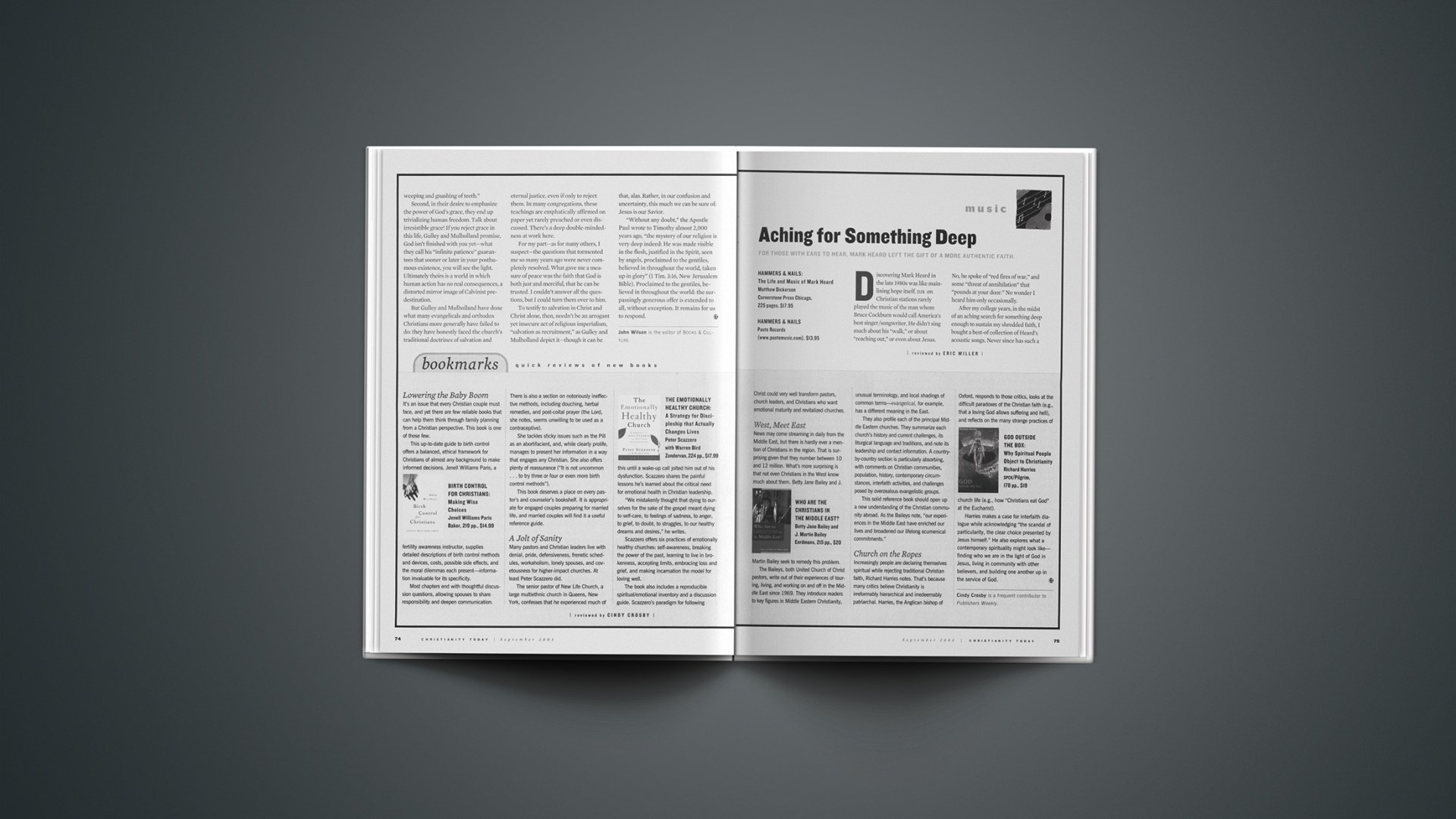Discovering Mark Heard in the late 1980s was like mainlining hope itself. DJS on Christian stations rarely played the music of the man whom Bruce Cockburn would call America’s best singer/songwriter. He didn’t sing much about his “walk,” or about “reaching out,” or even about Jesus. No, he spoke of “red fires of war,” and some “threat of annihilation” that “pounds at your door.” No wonder I heard him only occasionally.
After my college years, in the midst of an aching search for something deep enough to sustain my shredded faith, I bought a best-of collection of Heard’s acoustic songs. Never since has such a small investment yielded such amazing returns. His wedding in word and melody of raw confession, revealing observation, and restless probing far surpassed anything I had encountered by a Christian artist.
I was immediately in his debt, and Matthew Dickerson’s new book about Heard, Hammers & Nails, reveals that debtors like me abound. Crafted more as a mosaic than as a textured biography, it offers an unprecedented chance to peer into the life of a man who displayed a rare and beautiful vulnerability, song after song. His albums now total 20 with Paste Records’ production of a companion CD featuring previously unreleased songs Heard recorded in the late 1980s.
Heard aficionados will find the book (and CD) irresistible, but the story Dickerson tells has significance beyond the life of one musician. If the intersection of art, theology, and the market has any bearing on the future of Christianity in America, believers of all varieties will find something instructive, and perhaps ominous, in this story.
Born in Macon, Georgia, in 1951, Heard, we discover, was picking out songs on a piano before he was 4. By the time he entered college at the University of Georgia he had found his way to the guitar and to Christ, writing original music for his band and edging toward the Jesus Music scene.
His music bore the imprint of the era—country-tinged folk in the singer/songwriter vein—while his nascent faith was distinctively Southern and evangelical. In key respects, his life by his mid-20s had become a quest to transcend these worlds, while somehow staying true to what they were at their best. After hearing Francis Schaeffer speak at a Presbyterian church in Macon in 1975, Heard, like so many others of his generation and disposition, ventured to Switzerland and L’Abri in the hope that he might find answers to his deepening questions, and perhaps join his faith and art in a more satisfying way.
The long and costly sojourn Heard began that year turned out to be a rough one, as this book amply shows, but his lifelong musical and lyrical record of it is a treasure. Heard’s experience at L’Abri, intensive throughout the 1970s, gave him a counterpoint of near-salvific value to an evangelical Christianity that, he was discovering, had little ability to nurture him and his art. Still, he found himself wedded to that subculture (he called it “the ghetto”) through the auspices of two CCM record companies.
In the course of making seven albums for them between 1978 and 1985, he won the respect of critics but little favor from record-buyers. Dickerson’s interviews mesh with Heard’s lyrics and liner notes to reveal a man striving energetically, often angrily, to make contact with a world that couldn’t fathom him: when he sang about his own life the theme was often not triumph but anguish; when he turned his gaze toward the world he spoke, sometimes awkwardly, a language of social criticism that sounded alien alongside the lyrical fare of Amy Grant, Leon Patillo, and the other evangelical celebrities of the era.
In the mid-1980s Heard made a quick exit from the CCM scene. Without a record contract himself, he produced records for other artists, performed occasionally, and kept making music. Finally, in 1990 he established his own label, Fingerprint Records, and released three albums that were, in a word, stunning; one critic went so far as to posit that “arguably, no artist has crafted three consecutive albums with both the lyrical radiance and the musical vibrancy to rival The Dry Bones Dance, Second Hand, and Satellite Sky.”
As he was nearing an agreement with a mainstream label in 1992, he died at the age of 40 after suffering two heart attacks.
By the time he recorded his last three records, the dense brilliance of his art crowned a pilgrimage of unusual intensity, honesty, intelligence, and pain. On his last record, he describes himself as a “broken man … outcast on the outskirts of the promised land”—poignant evocation of his bewildered disappointment at so many levels. But he goes on in the album’s last song to steer the listener toward another lonely place, where triumph mingles always with pain.
I saw the city at its tortured worst
And you were outside the walls there
You were relieved of a lifelong thirst
I was dry at the fountain
I knew that you could see my shame
But you were eyeless and sparing
I awoke when you called my name
I felt the curtain tearing
It’s a fitting final confession for a man who sought above all to help us to be true. Of his many gifts to us, this was his greatest. Fortunately for us, it’s a gift that keeps on giving. Maybe someday we’ll receive it.
Eric Miller directs the humanities program at Geneva College in Beaver Falls, Pennsylvania.
Copyright © 2004 Christianity Today. Click for reprint information.
Related Elsewhere
The book and album have an official website.
Hammers & Nails: The Life and Music of Mark Heard is available at Amazon.com and other retailers. The Cornerstone Press Chicago website offers an excerpt of the book.
The Hammers and Nails album is available at Pastemusic.com.
Other good Mark Heard sites are Mark Heard Remembered, the Mark Heard Lyrics Project, and The Mark Heard Tribute Project.










